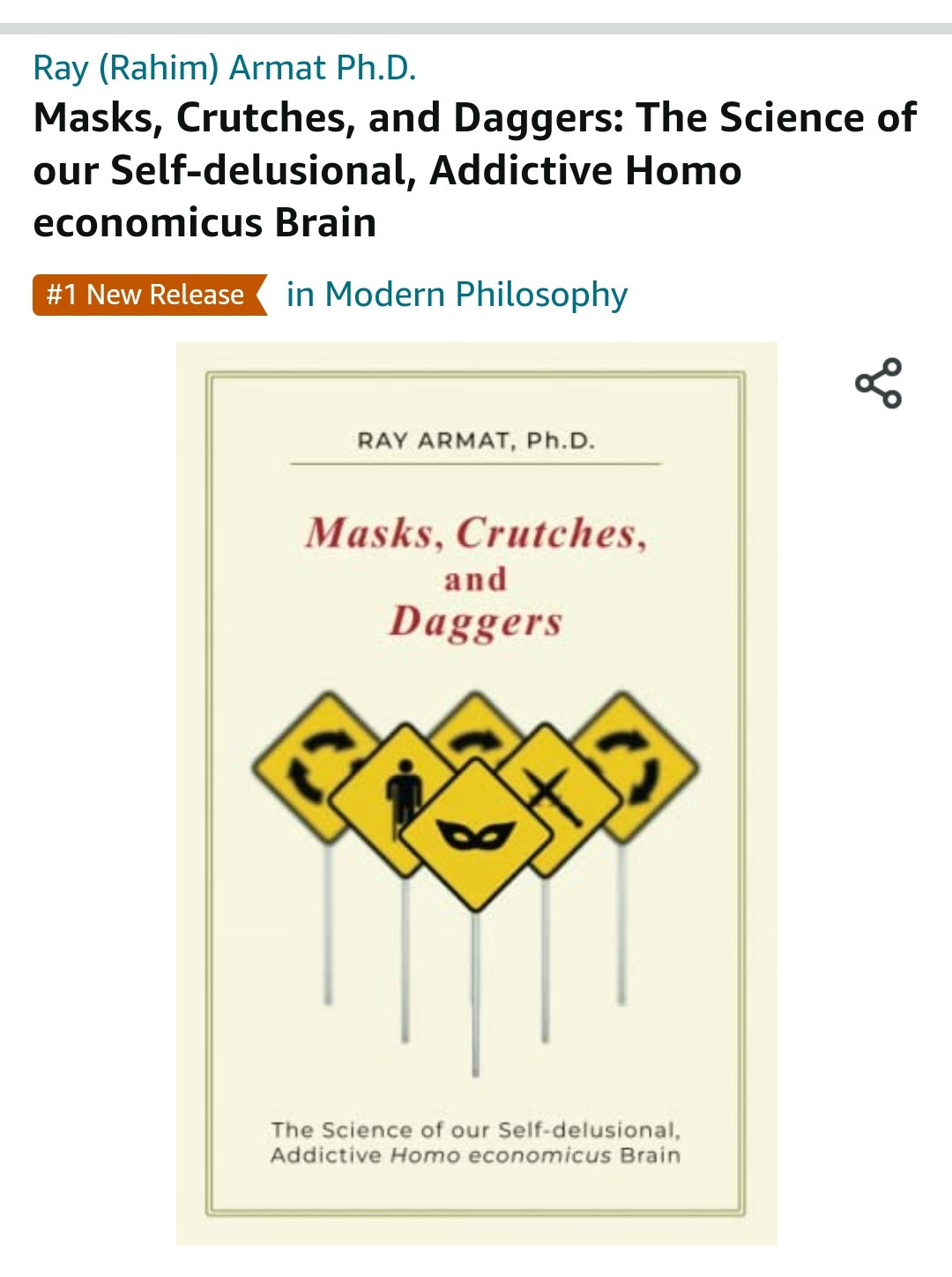Informal Tennis Shoes: How a Top Microbiologist Chose America Over Homeland France?
The Story of the Outspoken, Controversial Rene' Dubos
René Jules Dubos was a distinguished French-American polymath (microbiologist, pathologist and environmentalist) responsible for the first industrially produced antibiotic (Gramicidin, 1939) and also known for his catch phrase “Think globally, act locally!”
Few people know about his interesting life story, his humble beginnings in France (studying agriculture and working in hospitality industry) and how he ended in America to become one of the leading microbiologists (under Professor Avery) of The Rockefeller Institute for Medical Research, later renamed The Rockefeller University.
I have referenced some of his views and work in my book: Masks, Crutches and Daggers: The Science of our Self-Delusional, Addictive Homo economicus Brain. The following is a summary:
Dubos reflects on his life story in his 1980 book Quest: Reflections on Medicine, Science, and Humanity. He shares how the informal style and flexibility of the American culture was more appealing to young people like him than the rigid structural formalities in his birthplace France. He discusses how impressed he was by a total stranger, Dr. Asher Hobson, a distinguished American professor he met by chance in Rome, who graciously helped him on his journey to America. He remembers Professor Ashton as the only scientist who didn’t care to wear the aristocratic top hat, an insignia of eminence, worn by other scientists and politicians in the prestigious meeting (The International Congress of Forestry) in Rome.
He also discusses how the openness and flexibility of American institutions and culture helped him with his decision to stay and work in the United States. He was particularly outraged when in 1938 he went back to his birthplace to meet the Director of Institut Pasteur in Paris. At that point, Dubos was a distinguished researcher at The Rockefeller Institute for Medical Research and on the verge of a scientific breakthrough (extraction of Gramicidin, a bactericidal antibiotic agent from a soil Bacillus). But to his surprise, he was snubbed by the Institut’s French Director and not even allowed inside the offices because he was wearing tennis shoes, something common among American scientists and researchers!
Dubos was a visionary. In 1942, before antibiotics were in general use, Dubos warned that bacterial resistance should be expected. He was also known for his criticism of reductionist science and for-profit pharmaceutical and medical research industries. This is an excerpt from his interview by Dr. Escande translated and published in Quest: Reflections on Medicine, Science, and Humanity:
Dubos: If I may say so, scientists have sold their soul for grants!
Escande (the interviewer): What worries me is that what most people take for science is really only a bunch of conniving winks that scientists exchange with one another. So should scientists allow themselves to “sell hope” to the public in this way?
Dubos: In all the sciences, and especially in medicine, so much has been promised that the public is disillusioned... As a result, a fraction of the public is breaking away from medical establishment… No one has noticed how Pasteur stressed the fact that besides the microbe there are all sorts of other factors involving the climate and the patient himself. At the end of his life Pasteur.. was even able to write; “I am convinced that when a wound becomes infected and festers, the course that the wound takes depends on the patient’s general condition and even his mental condition.”
Dubos believed many bacteria and viruses are not inherently pathogenic: “No metabolic analysis of infectious disease is possible until an ecological concept is introduced to formulate the problem.”
His views on the futility of eradicating certain infectious diseases (artificially through mass vaccinations and widespread prescription of antibiotics) has found new proponents in recent scientific reviews.
Dubos won the 1969 Pulitzer Prize for his book So Human An Animal.
He died February 20, 1982, on his 81st birthday.
I share alternative views by Dubos and other prominent scientists about disease and ecosystem in my book: Masks, Crutches and Daggers: The Science of our Self-Delusional, Addictive Homo economicus Brain. I spent two years to draw from the latest discoveries in a wide range of disciplines — Neuroscience, evolution, biochemistry, psychology, economics, physics, philosophy, nutrition, and even mysticism — to understand the roots of self-delusion that plague human lives, rich and poor alike. The book is an essential simplified scientific “user manual” for our brain and body and how they communicate (feedback Loops), balance (for health), or burn out (for disease). I believe I have identified the common denominator of disease, disorder, disparity and discord (fights, divorces, lawsuits, riots, wars) that plague our lives. Here is the book’s introduction on Amazon’s Hot New Release in Behavioral Psychology (the book’s promotional sales at 23% OFF ends this week):
A Simple Practical Guide to How Your Brain and Body Communicate (Feedback Loops), Balance (Health), or Burn Out (Disease)
Most of us know more about sports, politics, games, apps, and our jobs than about how our own brain and body work or get burned out together. For less than the cost of a family dinner, this is one of the few books in the market that can help us understand in simple language the complex nature of body-brain feedback loops as the common denominator of disorders and diseases (such as diabetes, hypertension, weight gain, dementia, sleep disorders, constipation, infertility), and discords (fights, divorces, lawsuits, riots, wars). The author has spent two years to ingeniously draw from the latest discoveries in a wide range of disciplines: Neuroscience, evolution, biochemistry, psychology, economics, physics, philosophy, nutrition, and even mysticism to help us understand the roots of fatigue and imbalance that plague human lives, rich and poor alike. This book is an essential simplified scientific “user manual” for our brain and body.
The world’s largest battles are fought inside human minds and today most of us suffer from abuse not by others but by our own brain. Why do humans walk such a tight rope between depression and addiction (habituation), anxiety and recklessness? Why is it so hard to kick bad habits? Why are several countries now have Ministries of Loneliness to keep the social fabrics from falling apart? Why are humans so prone to self-delusion, self-deception, and forming mobs and cults? In this book, we learn, in simple language, about the neurochemical soup that makes our brain prone to metabolic imbalance and leads to pursuit of unfettered growth. "The sky is the limit" thinking has constructed a world of winners, losers and barely anyone in between.
A Unique Book and Author
Today self-censorship is the main form of censorship that constrains and compromises sponsored writings and speeches. The scientific insight and life stories shared in this book are candid, uncensored and heartfelt, shared by an author who is an independent scientist philosopher, and a freelance educator living by his motto "Guided by Conscience, Not Mobs!"
A graduate of University of Michigan and Case Western Reserve University, Ray Armat, Ph.D., is a materials scientist, chemical engineer, former NASA grantee and educator with years of interdisciplinary corporate research, business development and academic experience. He specialized in balancing industrial product formulas but once he realized his own body and mind were imbalanced, he tempered his ambitious career goals to learn more about the human brain and behavior. He shares how he had an epiphany during a stay at Frank Sinatra's original house. As a scientist philosopher, storyteller and educator, he uses a unique and rare blend of real life stories and scientific first principles that govern both natural and industrial processes to find unifying explanations to disease, disorder and discord. The book will be eye-opening and life-changing for many readers.






ok, I will read it. looks fascinating.